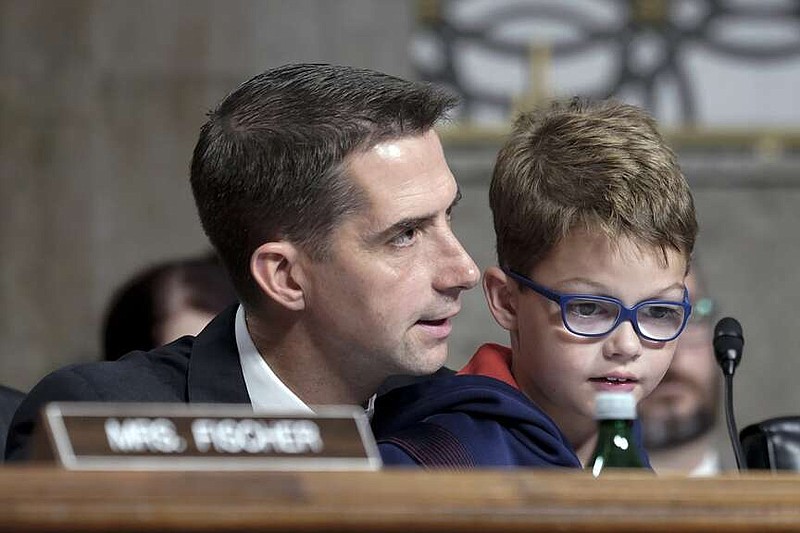WASHINGTON -- Legislation introduced in the U.S. Senate in November seeks a nationwide study to measure the impact of mobile devices in public schools, as well as a program to evaluate turning campuses into mobile-free zones.
Senate Bill 3266, or the Focus on Learning Act, is sponsored by Sen. Tom Cotton, R-Ark., and cosponsored by Democratic Sen. Tim Kaine of Virginia.
The bill, if passed, would direct the U.S. Secretary of State "to conduct a study regarding the use of mobile devices in elementary and secondary schools, and to establish a pilot program of awarding grants to enable certain schools to create a school environment free of mobile devices."
The bill defines mobile devices as "any personal mobile telephone or other portable electronic communication device with which a user engages in a call or writes or sends a message or any device in which the user plays a game or watches a video." It excludes school-issued devices.
The goal of the study is layered: to measure the impact of mobile devices on student learning and academic achievement; educational outcomes and engagement; mental health; classroom instruction; school climate; and student behavior.
The proposal would require the Secretary of Education to conduct the study no later than two years after passage of the bill.
Additionally, the SB 3266 would allocate $5 million to test a program for making schools mobile-free zones.
Before applying for the grant, schools that would like to participate in the program would have to inform parents at least 30 days before applying for the grant and get feedback from them.
The bill allows for such exemptions as mobile devices used to monitor health conditions and to provide translation services for students who are English learners.
The Focus on Learning Act has been referred to the Senate's Committee on Health, Education, Labor, and Pensions.
In a conversation with the Gazette, Cotton shared his thoughts about the proposal, including why he introduced the legislation. The senator's unedited responses follow.
------
Q: What influenced the creation of this legislation? Was it a particular incident?
Sen. Cotton: We know that cellphones in schools are at best a distraction. At worst, they can lead to cyberbullying and expose children to harmful content. My bipartisan effort with Senator Kaine is a reflection of a widespread desire to make sure kids are going to school to learn and grow with their peers. Also, as the father of two young boys, I'm concerned about the effects phones have on children's development.
Q: What kind of support has your proposal received?
Cotton: Both Senator Kaine and I have heard from teachers and parents alike about how phones in school are a major distraction in school and that the ideas we're proposing could help solve that problem.
Q: The proposal mentions an appropriation of $5 million to implement the pilot program. How many educational agencies would this fund, and how much would each receive?
Cotton: The number and which agencies is at the discretion of the Department of Education.
Q: Would the $5 million come through an appropriations bill or something else?
Cotton: The bill would authorize for $5 million in federal funding for the Department of Education to then allocate. Funding for lockers and pouches would be permissible under Title IV ESSA.
Q: The bill states schools participating in the pilot program should "have a clear process for students to be able to contact their parents." What does such a process look like to you?
Cotton: The legislation requires that schools engage with parents, educators, principals and school leaders before applying for the program. So, the schools will discuss implementation with parents, teachers, and school leaders and set up a process that works best for their school.
Q: The legislation refers to the purchase of "secure containers" and the installation of lockers. Would these items be located inside classrooms, at the entrances at schools, in the office, or in some other central location?
Cotton: The location of the lockers or the decision to implement secure pouches over lockers would be up to the school district.
Q: How much latitude would schools have in creating and implementing strategies to make their campuses mobile-free?
Cotton: The only requirement is that school districts implement a cellphone free policy for the entire school day using lockers or containers.
Q: Would parents be able to opt out of the program?
Cotton: No.
Q: During the pilot program, how would infractions be handled?
Cotton: That would be up to the school. We want to give the parents and educators the tools they need and then let them create the best system for their schools.
Q: To clarify, does the legislation include smartwatches?
Cotton: Mobile device is defined as means any personal mobile telephone or other portable electronic communication device with which a user engages in a call or writes or sends a message or any device in which the user plays a game or watches a video, except that such term does not include school-issued devices. Smart watches that are used solely to track athletic performance, or used to treat a health condition are not included in the definition.

